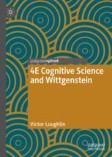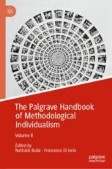Search
Search Results
-
Imagery in action. G. H. Mead’s contribution to sensorimotor enactivism
The aim of the article is to outline several valuable elements of Mead’s pragmatist theory of perception in action developed in his The Philosophy of...
-
Emotional Impulsivity and Sensorimotor Skills
In this paper I propose an explanation for the impulsivity displayed by some of our emotional experiences. I begin by looking for such an account in...
-
Personal Autonomy and (Digital) Technology: An Enactive Sensorimotor Framework
Many digital technologies, designed and controlled by intensive data-driven corporate platforms, have become ubiquitous for many of our daily...
-
Grief’s impact on sensorimotor expectations: an account of non-veridical bereavement experiences
The philosophy of grief has directed little attention to bereavement’s impact on perceptual experience. However, misperceptions, hallucinations and...
-
Autism as Gradual Sensorimotor Difference: From Enactivism to Ethical Inclusion
Autism research is increasingly moving to a view centred around sensorimotor atypicalities instead of traditional, ethically problematical, views...
-
Radical and Sensorimotor Enacted Mind
In this chapter, I examine Enacted Mind. I consider Radical Enactive or Embodied Cognition (REC) and Sensorimotor Enactivism. Both approaches...
-
Enactive Cognition: From Sensorimotor Interactions to Autonomy and Normative Behavior
This chapter examines the foundational claims of enactive cognition in its seminal work, The Embodied Mind. This analysis underscores the original...
-
Game theory and partner representation in joint action: toward a computational theory of joint agency
The sense of agency – the subjective feeling of being in control of our own actions – is one central aspect of the phenomenology of action....

-
Intentional action and knowledge-centered theories of control
Intentional action is, in some sense, non-accidental, and one common way action theorists have attempted to explain this is with reference to...
-
Introduction to the special issue ‘The phenomenology of joint action’
The contributions collected in this special issue explore the phenomenology of joint action from a broad range of different disciplinary and...
-
Explaining Social Action by Embodied Cognition: From Methodological Cognitivism to Embodied Individualism
The term Methodological Cognitivism was introduced in the late 90s when cognitivism was dominated by the information-processing psychology approach....
-
The unbearable rightness of seeing? Conceptualism, enactivism, and skilled engagement
Building on the landmark O’Regan and Noë (Behav Brain Sci 24:939–973, 2001) that introduced us to the sensorimotor theory of perception, Alva Noë has...

-
Expecting some action: Predictive Processing and the construction of conscious experience
Predictive processing has begun to offer new insights into the nature of conscious experience—but the link is not straightforward. A wide variety of...
-
Action control, forward models and expected rewards: representations in reinforcement learning
The fundamental cognitive problem for active organisms is to decide what to do next in a changing environment. In this article, we analyze motor and...

-
Against intellectualism about skill
This paper will argue that intellectualism about skill—the contention that skilled performance is without exception guided by proposition...
-
A match made in heaven: predictive approaches to (an unorthodox) sensorimotor enactivism
It has been pointed out that Sensorimotor Enactivism, a theory that claims that perception is enacted and brought about by movement, says very little...
-
Displaying Inner Experience Through Language and Body in Community Theater Rehearsals
Using multimodal conversation analysis, we investigate how novices learning the “inner body” acting technique in the context of a community theater...

-
How passive is passive listening? Toward a sensorimotor theory of auditory perception
According to sensorimotor theory perceiving is a bodily skill involving exercise of an implicit know-how of the systematic ways that sensations...
-
Tools as Extenders: The Pathway to Functional Incorporation
This chapter sets the preconditions and limits for ECM. It distinguishes between four different levels of extension: momentary extension, integrated...
